Today Julian Assange faced his last extraditon hearing (apparently). We will be updating Court´s events in Belmarsh here. If you have related live information and audio or video feeds, please send to @wikileaks_world on Twitter.
After 1 hour and 45 minutes, the hearing is over. Judge orders Assange be extradited in Sweden. Assange has 7 days to appeal. For now, he will remain on bail. Lawyer Mark Stephens says they will appeal.
Full judgement is up here.
Relevant Twitter feed from Belmarsh, based on @federicacocco, @estheraddley, @c4marcus and @ravisomaiya:
c4marcus (12.13 GMT)
#Assange bailed until 2pm while issues around sureties are sorted out.
.
federicacocco (12.12 GMT)
Judge: Assange will remain on bail
.
federicacocco (12.10 GMT)
Robertson: To save time, we have 2 alternative sureties. One of the original sureties was Lord Evans but he couldn't be here today
.
estheraddley (12.10 GMT)
Decision postponed on costs. On bail, defence offering two alternative suretors. Judge 'I'm afraid I don't know who these people are'
.
(12.08 GMT)
Judge: I can't rule on costs today as Crown hasn't provided me with their total. #Assange
.
federicacocco (12.05 GMT)
Judge: A schedule has not been made. For these purposes, the court has no longer jurisdiction after today.
.
federicacocco (12.05 GMT)
Judge: In principle I would today make an order for costs in the amount I consider Judge. Today I'm not in a position to assess costs
.
c4marcus (12.00 GMT)
Appears Crown aren't actually sure what their costs are, which is making dealing with that issue today a bit tricky. #Assange
.
federicacocco (11.58 GMT)
Judge to prosecution: If the appeal in successful you have a right to apply for the reimbursement of legal costs
.
federicacocco (11.56 GMT)
MADRID - Today the auditorium of the Reina Sofia museum in Madrid hosted a debate between the chief editors of the five major newspapers involved in cablegate: Javier Moreno from El Pais, Alan Rudbridger from The Guardian, Sylvie Kauffmann from Le Monde, Georg Mascolo from Der Spiegel and Bill Keller representing The New York Times. The theme was the future of journalism in the new global context set by Wikileaks.
We live tweeted the event here.
There was plenty of expectation, and early on in Twitter trends users were wondering if we would see a true discussion and not an orchestrated charade. This was important as most of the audience was made up of young reporters and students on assignment from their Universities: if the debate was to be centered on the future of journalism and its new model then the way it was to be carried out had to be convincing for the future players present. It seemed, however, that the organizers had planned on trying to have a big impact on the future generations, as they lined up students of a journalism Master sponsored by El Pais behind the main participants, though it was still unclear if they would be allowed to join in the debate. As they went in, the viewers were given a piece of paper each, in which they were supposed to write down a question addressed to one of the five editors. It is a shame that even though the scene was perfectly set for an interesting and enriching discussion, full of young people ready to carry the torch when their time comes, it turned out to be sterile: no participation was allowed from and the master students were a little bit more than a stage prop.
 @wikileaks_world
@wikileaks_world
english coverture of @el_pais @nytimes @guardian @lemondefr & @DerSPIEGEL #today to #discuss #jornalism & #wikileaks on #wldebatemadrid
on 23 Feb 2011 11:57:43.
...
 @wikileaks_world
@wikileaks_world
Event starting at 17.30 GMT #wldebatemadrid #pconfuturo complete report on @wl_central
on 23 Feb 2011 11:58:57.
...
 @skdadl
@skdadl
Livetweet of discussion amng eds of "5 majors" who 1st pub'd WikiLeaks cables: #wldebatemadrid Begins 18:30 Madrid 2:30 EST. Please RT.
on 23 Feb 2011 17:02:51.
...
 @dontmentionit
@dontmentionit
RT @skdadl: Livetweet of discussion amng eds of "5 majors" who 1st pub'd WikiLeaks cables: #wldebatemadrid Begins 18:30 Madrid 2:30 EST. Please RT.
on 23 Feb 2011 17:02:53.
...
 @wikileaks_world
@wikileaks_world
@el_pais @nytimes @guardian @lemondefr & @DerSPIEGEL - Live feed of the meeting in english on #wldebatemadrid #wikileaks by @wl_central
on 23 Feb 2011 17:15:56.
...
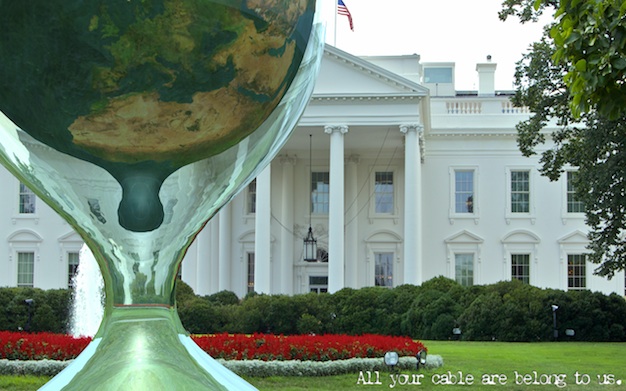 El País: Estados Unidos presionó a Uribe para hacer una limpia en sus servicios de espionaje (U.S. pressure on Uribe to make a clean intelligence services)
El País: Estados Unidos presionó a Uribe para hacer una limpia en sus servicios de espionaje (U.S. pressure on Uribe to make a clean intelligence services)
"Estados Unidos presionó en 2009 al entonces presidente de Colombia, Álvaro Uribe, para que hiciera una limpieza a fondo en el Departamento Administrativo de Seguridad (DAS), la agencia de espionaje que depende directamente del presidente del país. Los cables del departamento de Estado filtrados por Wikileaks revelan cómo el embajador de Estados Unidos en Bogotá, William R. Brownfield, amenazó al entonces vicepresidente Francisco Santos con endurecer las relaciones de su país con los servicios secretos colombianos. Santos reconoció que Uribe no comprendía a fondo la gravedad de la crisis y pidió al embajador que hablara directamente con Uribe para convencerle de la necesidad de tomar medidas efectivas respecto al DAS. (The United States pressed in 2009 the then President of Colombia, Alvaro Uribe, to do a thorough cleaning at the Department of Administrative Security (DAS), the spy agency that reports directly to the president. The State Department cables leaked by Wikileaks reveal how the U.S. ambassador in Bogota, William R. Brownfield, threatened the then Vice President Francisco Santos to toughen his country's relations with the Colombian secret services. Santos acknowledged that Uribe did not understand fully the gravity of the crisis and asked the ambassador to talk directly to Uribe to convince of the need to take effective action on the DAS.)"
Current time and date in Wisconsin:
 Wisconsin? Yes, Wisconsin... WL Central has been covering all the protests worldwide. WL Central has been looking at countries regardless of whether there are WikiLeaks cables handy. And at 5:44 PM, hundreds if not more than a thousand people are in the capitol about to be removed by police.
Wisconsin? Yes, Wisconsin... WL Central has been covering all the protests worldwide. WL Central has been looking at countries regardless of whether there are WikiLeaks cables handy. And at 5:44 PM, hundreds if not more than a thousand people are in the capitol about to be removed by police.
Many of the people in Wisconsin are inspired by Egypt just like many others in the Middle East and North Africa have been moved to act. And, actually, it's not entirely true that there is nothing out there to color what is happening in Wisconsin, to illuminate the anti-worker anti-union politics that has been spreading throughout the states. If one looks at the following cable 06MEXICO2220, one can infer that the US government views workers that try to wield political power and unions which wage battles against governments as players that could threaten a country's economic stability.
In this cable, ten economic challenges that the next president of Mexico will face are outlined. One of them is "Taking On the Unions without Shutting Down the Country":
12. (SBU) Few major reform proposals will move forward without
some confrontation or deal with the unions representing the
affected industries. Unions gained power and influence over many
decades of working closely with the PRI, delivering votes in
exchange for unaffordable benefits for workers and untold riches
for union leaders. Due to union protections, for example, the
state-owned Mexico City electric utility (LyFC) has what is in
effect its own construction and manufacturing subsidiaries with
some 10,000 employees. LyFC retirees not only retire at full
 The Guardian: A guide to Gaddafi's 'famously fractious' family
The Guardian: A guide to Gaddafi's 'famously fractious' family
"US embassy cables shed light on Gaddafi family – including son Saif al-Islam, who vowed in TV address to eradicate enemies.
The leader of the Libyan revolution presides over a "famously fractious" family that is powerful, wealthy, dysfunctional and marked by internecine struggles, according to US diplomatic cables released by WikiLeaks. The documents shed light on how his eight children – among whom rivalries have sharpened in recent years – his wife and Gaddafi himself lead their lives."
Aftenposten: SECURING ADDITIONAL ALLIED/PARTNER CONTRIBUTIONS TO ISAF IN SUPPORT OF PRESIDENT OBAMA"S UPCOMING ANNOUNCEMENT ON AFGHANISTAN
"When President Obama announces his decision on possible U.S. troop increases for Afghanistan, the impact could be far greater if other Allied and Partner leaders would announce increases of their own either simultaneously or in close succession. Several Allies and Partners have the military capacity to make significant additional contributions, and if they showed the political will to follow through that would send a strong signal of resolve and unity of purpose to the international audience, Al Qaeda and the Taliban. We should use the time between now and the Presidents announcement to engage select Allies and Partners at the highest levels to secure commitments to those additional military, civilian and monetary contributions. Below is a summary of nations that we believe can do more now. Of these countries, we believe Germany, Italy, and the UK are the most likely to respond positively."
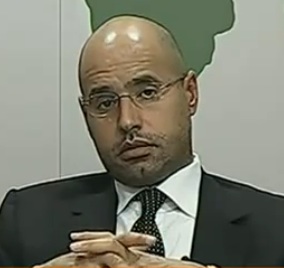 An address from Muammar al-Gaddafi’s son, Saif al-Islam al-Gaddafi, was aired on television in Libya early on February 21. Saif al-Islam told Libyans he had come without a prepared speech and was going to speak from his heart and mind.
An address from Muammar al-Gaddafi’s son, Saif al-Islam al-Gaddafi, was aired on television in Libya early on February 21. Saif al-Islam told Libyans he had come without a prepared speech and was going to speak from his heart and mind.
The address (which you can read here) was given as Tripoli was turning into more of a battlefield. Snipers were firing in Saha Al Khadra. His father’s “thugs” were allegedly going into hospitals and killing Libyans who had been out in the streets and been wounded.
Rumors are circulating that Saif al-Islam was shot. Some of the unconfirmed reports say Saif al-Islam is dead and his father and some from the Gaddafi family has fled. Muammar has gone to Venezuela, some reports allege.
The death of Saif al-Islam is possible, but until there are reports which go beyond unconfirmed, this is largely a distracting story. What Saif al-Islam said in the recorded address that aired on February 20 is much more important.
Saif's Address to Libya
 Aftenposten: READOUT NORTH ATLANTIC COUNCIL MEETING JANUARY 28, 2009
Aftenposten: READOUT NORTH ATLANTIC COUNCIL MEETING JANUARY 28, 2009
"AFGHANISTAN: ISAF Senior Civilian Representative Gentilini said the Afghans were eager for NATO to respond to its proposal for a military technical agreement, sent to NATO in early January. The SCR and several Perm Reps stressed that a MTA with the Afghans could help address the issue of civilian casualties, but many cautioned that the legal difficulties involved in negotiating such an agreement called for the Alliance to proceed with caution. Saying it needed more time to seek instructions, Hungary blocked consensus on a decision that fully filling the Elections Support Force (ESF) should take priority over filling the NATO Response Force (NRF), which would have allowed nations to pull NRF components for use in the ESF. The NAC will revisit the issue next week."
Aftenposten: AMBASSADORS JANUARY 11 MEETING WITH NATO SENIOR ISAF REPRESENTATIVE ON GIROA PROPOSED AFGHANISTAN-NATO MILITARY TECHNICAL AGREEMENT
 Aftenposten: NORTH ATLANTIC COUNCIL READOUT MAY 2, 2007
Aftenposten: NORTH ATLANTIC COUNCIL READOUT MAY 2, 2007
"Afghanistan: Allegations of civilian deaths near Herat seized PermReps, attention as the U.S. and Spain push for NATO to develop a response to such allegations. SHAPE focused attention on increased enemy suicide attacks and the need to counter increasing IED attacks, including through better training and HQ staffing, as well as the heightened enemy interest and build-up in Kabul and environs. Ambassador Nuland urged Allies to focus greater effort on countering IEDs, to do more to train Afghan forces, and to follow U.S. leadership in staffing HQ ISAF. Portuguese Quick Reaction Force (QRF) to deploy to RC-S later in May."
El País: Un exministro peruano pidió colaboración a EE UU para frenar el avance electoral de Ollanta Humala (A Peruvian ex-minister asked to the United States to collaborate on stopping Ollanta Humala's progress before the elections)
"Fernando Rospigliosi, antiguo responsable de Interior con Alejandro Toledo, buscó en 2005 el apoyo de la Embajada en una campaña contra el candidato nacionalista. Los diplomáticos estadounidenses rechazaron la petición. (Fernando Rospigliosi, former responsible of interior with Alejandro Toledo, searcher in 2005 support from the American Embassy on a campaign against the nationalist candidate. The American diplomats refused the petition.)"
(Image Credit: Dali Rău)

The third episode of this weekly podcast, which looks at stories related to WikiLeaks from the past week, featured guest Michael K. Busch, who teaches international relations at the City College of New York, where he is also program coordinator at the Colin Powell Center for Policy Studies. He has posted on blogs on released cables on WikiBlogged, and he is listed as a resource in the back of Greg Mitchell's recently published book, "Age of WikiLeaks," which you can purchase in print on Blurb.com or in e-book form off of Amazon. [Follow him on Twitter @michaelkbusch]
The program for this week's show was dedicated to protests and violence in the Middle East and North Africa (MENA). The show will provide updates on what is happening in the region and discuss some released WikiLeaks cables that provide context for what is happening.
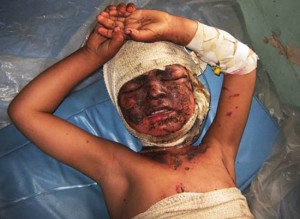 The Norwegian newspaper Aftenposten has published an article on NATO, US, and the Red Cross and the Bala Baluk massacre on May 4, 2009. The article features a cable that shows the Red Cross put together a report that raised significant doubt about military reports on the number of civilians killed. The cable reveals how a PR campaign kicked into gear to sell the idea that the deaths were not intentional and to skew coverage of the event to fit the interests of NATO and US forces in Afghanistan.
The Norwegian newspaper Aftenposten has published an article on NATO, US, and the Red Cross and the Bala Baluk massacre on May 4, 2009. The article features a cable that shows the Red Cross put together a report that raised significant doubt about military reports on the number of civilians killed. The cable reveals how a PR campaign kicked into gear to sell the idea that the deaths were not intentional and to skew coverage of the event to fit the interests of NATO and US forces in Afghanistan.
A recent cable, from 2010, announces: “Jordan continues to face some of the most troubling challenges of King Abdullah's 10-year reign.¨ These problems are a deficit of USD 1.43 billion, unstable regional politics, originated from the continuous privilege of rural communities in the East Bank over urban communities with larger Palestinian populations, rigged elections and unequal political rights (09AMMAN813). The cables also reveal that this inequality is created by the government and pushed through by force: “The King's economic and political changes face domestic opposition from tribal leaders and an array of entrenched East Bank interests. The latter include many in the military, security services, and bureaucracy, who enjoy a disproportionate share of the current system”. (10AMMAN329).
According Amman News, Secretary General of the Popular Unity Party Saeed Dhiyab stated that “the clashes were instigated by a group of hooligans, and charged that security forces condoned the violence by not intervening to break out the fights”. The current unrest in Jordan seems to be -once again-, the response of the population towards a whole history of repression and injustice practiced by its government. The clashes started on the 18th of February in the capital, Amman, between protestors calling for political and economic reform, and a group for "Loyalty and Belonging" to King Abdullah II. The clash produced an unconfirmed number of victims. Foreign journalists reported violent threats to confiscate their cameras and the media is still gagged by the government.
Every day the constant flow of leaks reveals why the people are fighting so hard to tear down the regime and write a new constitution: they show Bahrain as a country based on media manipulation, government lobbying and all sorts of corruption and trafficking of influences.
Policies in Iraq
 La Jornada: Redes sociales, instrumento para detectar fraudes con visas de EU (Social Networks, tool to detect frauds with American visas)
La Jornada: Redes sociales, instrumento para detectar fraudes con visas de EU (Social Networks, tool to detect frauds with American visas)
"Wikileaks reseña este método de investigación; crece el número de solicitudes amañadas. (Wikileaks reviews this method of investigation; the number of fake applications grows.)"
Aftenposten: READOUT NORTH ATLANTIC COUNCIL MEETING FEBRUARY 11, 2009
"AFGHANISTAN: Discussion focused on scheduling strategic instructed dialogues prior to the Krakow Defense Ministers, meeting on the Afghan National Army Trust Fund, crafting an interim response to the Afghan-proposed military technical agreement, and Pakistani proposals for building closer cooperation with NATO. PermReps want to address discrepancies in ISAF and UNAMA counts of civilian casualties with visiting Special Representative of the UN Secretary General Kai Eide next week. Two topics related to NATO,s role in Afghan police development are stalemated in the Military Committee."
Aftenposten: ICRC REPORT ON FARAH CIVCAS INCIDENT STATES 89 CIVILIANS WERE KILLED
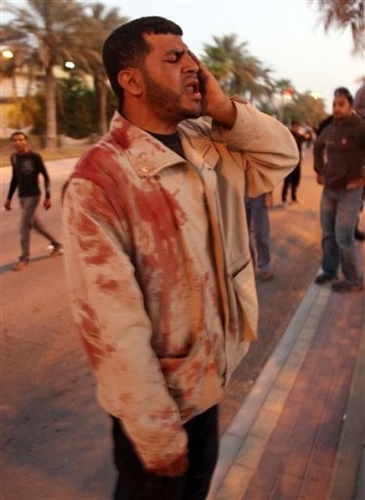 The streets of Bahrain are becoming increasingly violent. Security forces are using live rounds on protesters. Just over a day ago, right before dawn security forces ambushed protesters camping peacefully in the Pearl Roundabout, an area they had turned into their “Tahrir Square.” Many were injured, a few were killed. And, the world is witnessing the brutal discriminatory practices often used by the regime against Shia citizens and activists who dare to criticize the regime or exercise freedom of expression.
The streets of Bahrain are becoming increasingly violent. Security forces are using live rounds on protesters. Just over a day ago, right before dawn security forces ambushed protesters camping peacefully in the Pearl Roundabout, an area they had turned into their “Tahrir Square.” Many were injured, a few were killed. And, the world is witnessing the brutal discriminatory practices often used by the regime against Shia citizens and activists who dare to criticize the regime or exercise freedom of expression.
For years, a monarchy headed by King Hamad bin Isa al- Khalifa has come under sharp criticism for its use of torture. Amnesty International published a report on February 11 titled, “Crackdown in Bahrain: Human Rights at the Crossroads.” And now, WikiLeaks has released several cables detailing the torture of political prisoners and other Bahrainis.
Peter King (R-NY), chair of the US House Committee on Homeland Security, yesterday reintroduced legislation that would extend the definition of espionage to include publishing the names of sources who collaborate with the US military or intelligence services.
King had proposed similar legislation in 2010. Last week three members of the Senate Committee on Homeland Security, led by chairman Joe Lieberman (I-CT), reintroduced a similar bill, known as the SHIELD Act. In US congressional parlance, SHIELD appears to mean "Securing human intelligence and enforcing lawful dissemination."
Many students of the First Amendment have pointed out the dangers to journalism and publishing in the US if the definition of espionage (traditionally understood to involve intentional and interested transmission of information to a foreign power) were to be so broadened. The ACLU argues:
Two days ahead of calls to protest the Gaddafi regime in a “Day of Rage” on February 17, members of the Committee of the Families of the Victims of the Abu Salim Massacre came out to protest. Libyan attorney and human rights activist Fathi Terbil, who represents families that had family members massacred in mass prison killings that took place at the Abu Salim prison in 1996, was arrested. Terbil’s arrest led to an eruption of protests ahead of the planned “Day of Rage.”
Protesters showed up to the police headquarters in the city of Benghazi to demand his release. The crowd outside swelled to somewhere between one and two thousand. This response demonstrated how the Gaddafi’s refusal to prosecute those responsible for the massacre of nearly 1200 prisoners in over a decade ago has created a deep resentment among Libyans toward the regime.
The arrest was an example of how the Gaddafi regime treats “regime critics” or dissidents.
 The Guardian: Ugandan gay rights activist 'mocked' at rights seminar
The Guardian: Ugandan gay rights activist 'mocked' at rights seminar
"US embassy cable reports on Uganda's rising homophobia, even at a UN-backed human rights meeting attended by activist David Kato, who was later murdered."
The Telegraph: US wanted 'derogatory' information on Bahrain king's sons
"The US State Department secretly asked its diplomats in Bahrain to report any "derogatory" information about two of the King's sons and evidence of "rivalry" with senior members of the ruling royal family, leaked documents show."
Aftenposten: WOLFOWITZ AND GROSSMAN PRESS TURKS FOR SUPPORT ON IRAQ
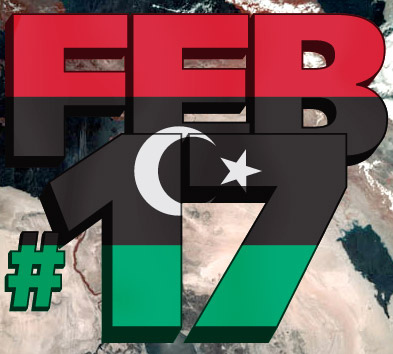 *Author's note: Previously, it had been mentioned that a Part 2 of a feature story titled "WikiLeaks Vindicates Those Behind Unfolding Revolutions" would run before the week was over. Publication has been postponed so proper coverage of cables and news related to Yemen, Algeria, Libya, Bahrain, Iran, Iraq, etc can be focused on instead.
*Author's note: Previously, it had been mentioned that a Part 2 of a feature story titled "WikiLeaks Vindicates Those Behind Unfolding Revolutions" would run before the week was over. Publication has been postponed so proper coverage of cables and news related to Yemen, Algeria, Libya, Bahrain, Iran, Iraq, etc can be focused on instead.
Libyans are mobilizing for a “Day of Rage” today on February 17. Protesters in the early afternoon, according to a member of the Libyan Youth Movement, were reported to be moving to the Security Headquarters in Benghazi. The protests are said to be gaining numbers and are headed for Maydan al Shajara once more, a location that had been the site of gunfire and petrol bombs.
The same individual also reports shortages of medical supplies at Al Bayda hospital and urges international health organizations to help out. And the movement member shared reports of people in Benghazi managed to chase away “pro-government Gaddafi thugs” by throwing rocks at them.
Many in Libya believe ahead of the “Day of Rage” that the Gaddafi regime was planning to threaten Libyans with live fire and the targeting of family members if they participated in anti-government protests. Also, it was reported that Gaddafi was having government employees go protest at pro-Gaddafi rallies, and, if they refused, they would be fired.
Cables released on Libya provide context for the protests that are unfolding. 09TRIPOLI192 from February 2009 titled, “For Ordinary Libyans, It’s the Economy Stupid,” breaks down what might be frustrating Libyans and why Egypt may have been just what they needed to be inspired to take action. The cable suggests Libyans are more interested in economic democracy, not political democracy:
Theme by Danetsoft and Danang Probo Sayekti inspired by Maksimer